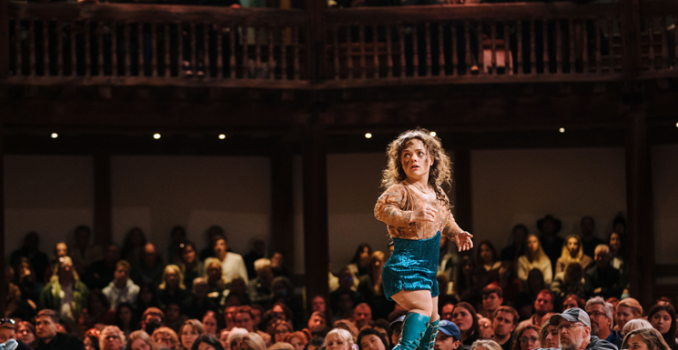
While’s production adds layers of complexity to the romantic comedy, blending gender fluidity and a sense of unease
A Midsummer Night’s Dream at Shakespeare’s Globe Review: Elle While Brings a Dark, Fresh Twist to the Classic
While’s production adds layers of complexity to the romantic comedy, blending gender fluidity and a sense of unease
Entertainment
Elle While’s production of A Midsummer Night’s Dream at Shakespeare’s Globe is a welcome reimagining of a play that has been performed countless times. Though traditionally viewed as a lighthearted romp, While’s version introduces an unsettling edge to the comedy, exploring the darker themes of romantic confusion and control that are often overshadowed in more conventional renditions.
In this production, Oberon, the Fairy King, manipulates his partner Titania through magical deceit and sexual coercion, turning what is often seen as whimsical mischief into a more sinister dynamic. This dark undertone is maintained throughout, with Puck, played by Michelle Terry, embodying both charm and menace as an ambivalent trickster figure. Terry’s portrayal of Puck, who emerges from the ground with a twisted mask and crown of twigs, adds to the eerie atmosphere.
The production’s visual style is equally unconventional. While the costumes are largely Elizabethan, they are interspersed with nods to 1980s pop culture, blending past and present in a way that underscores the play’s themes of disorientation and confusion. Gender-fluid casting adds depth to the portrayal of the young lovers lost in the forest, further blurring the boundaries between identities and affections. Isobel Thom, who is non-binary, plays Helena, while Lysander (Sam Crerar) and Demetrius (Vinnie Heaven) are presented as androgynous figures. This approach adds a modern, inclusive layer to the relationships at the heart of the play.
Francesca Mills, who plays Hermia, delivers a standout performance. Mills, who has achondroplasia, brings a new dimension to Hermia’s struggles with height-related slurs and her mistreatment by the men. Her portrayal is both vibrant and heartbreaking, making Hermia’s journey even more poignant.
While the mechanicals’ comic performances are traditionally a light-hearted highlight, While’s production shifts the dynamic, with several of these roles now played by women. Mariah Gale’s portrayal of “Nicola” Bottom offers a bittersweet touch of self-awareness, and when transformed into a donkey, her performance retains a tragicomic quality.
Titania and Hippolyta (Anne Odeke) are given more agency in this version, challenging their husbands’ authority. Hippolyta, in particular, is portrayed as drunk and disillusioned with her marriage to Duke Theseus (Jack Laskey), adding a layer of feminist rebellion to the play.
Though the play’s three-hour length can be trying at times, While’s editing keeps the pace moving, and the live five-piece band adds another layer to the production. Composed by James Maloney, the music—evocative of Jeremy Deller’s Acid Brass—enhances the otherworldly atmosphere, with the disorienting sounds of Hanna Mbuya’s tuba amplifying the sense of menace and confusion.
While not all the production’s ideas land perfectly, Elle While’s A Midsummer Night’s Dream succeeds in offering a fresh, complex take on a well-worn classic, reminding even the most seasoned Shakespeare enthusiasts that there’s always more to discover in the play.










